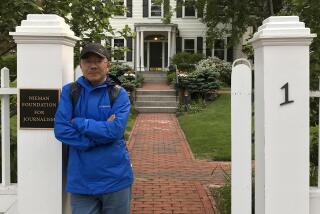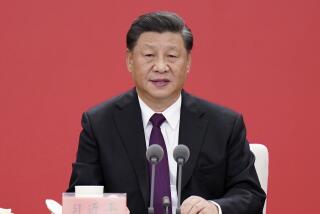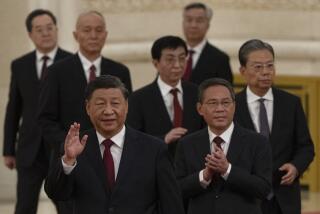China Acts to Curb West’s Influence : Regime Seeks Controls on Universities, Foreign Media
BEIJING — Newly appointed Communist Party General Secretary Jiang Zemin, acknowledging that Western values have won wide support among China’s youth, has called for greater ideological control on university campuses, official media reported Saturday.
Jiang’s comments, made Friday at a national conference on higher education, came as authorities stepped up restrictions on access to domestic and foreign publications that challenge China’s harsh new official orthodoxy. As portrayed in the state-controlled media, leading reformers and pro-democracy student demonstrators now have become counterrevolutionaries and criminals.
The latest step aimed at wiping out uncensored views has been the removal of foreign newspapers and magazines from luxury hotels in Beijing. These publications--including Hong Kong newspapers in English and Chinese, the International Herald Tribune and major U.S., European and East Asian newsmagazines--routinely carry accounts of events in China that vary sharply with the official line.
‘It’s Not Clear’
A sales clerk at the Jianguo Hotel, asked Saturday why no foreign publications were available, replied with a time-honored phrase traditionally used by Chinese to deal with dangerous questions during times of political crisis: “ Bu qingchu ,” meaning, “It’s not clear.”
If the ban on imported publications continues, visiting foreign business people and tourists in Beijing will have virtually no access to information on events outside China or to uncensored reports on developments inside the country. China has one English-language newspaper, the China Daily, but it carries only a small quantity of foreign news.
Foreign residents of Beijing, however, have so far continued to receive their subscriptions to overseas publications, which come primarily by air from Hong Kong.
A crackdown on domestic Chinese-language publications, including books by reformist intellectuals, is also being intensified.
The state Press and Publications Administration has issued an urgent circular calling for the confiscation and destruction of books “related to planning and organizing counterrevolutionary rebellion, advocating bourgeois liberalization (a code term for Western-style civil liberties), pornographic publications and those spreading superstition,” the China Daily reported Saturday.
Influence of West
Jiang, who replaced reformist leader Zhao Ziyang after a bloody military crackdown on pro-democracy protesters last month, said in his speech at the education conference that “quite a number of young people have been greatly influenced by Western culture and ideology in recent years.”
“Yet we have slackened correct ideological education among them,” Jiang said. “As a result, they are not mentally prepared to face the hardships and complexities in socialist construction and reform.”
Jiang acknowledged, according to a report in the official People’s Daily, that many young people wonder whether socialism or capitalism is superior, and they question why the Communist Party must continue to rule China.
To deal with this, Jiang said, more political workers should be assigned to conduct “Marxist education” among young people, “so as to help them realize that the leadership of the Communist Party and the socialist system are indispensable for China to become prosperous.”
Chinese media reports Saturday indicated that the effort to exert ideological control now has extended even to Hong Kong, where the rebellious director of a leading Beijing-controlled newspaper, Wen Wei Bao, has been fired.
State-run television reported that Lee Tze-chung, 78, was fired under instructions from the Hong Kong office of China’s New China News Agency, which exercises control over Wen Wei Bao.
Under Lee’s leadership, the newspaper had maintained a reformist course, favoring the now-disgraced Zhao even after his fall from power and the subsequent massacre of pro-democracy protesters in Beijing.
Lee was replaced by Chen Bojian, a former vice director of the New China News Agency who was already working at Wen Wei Bao. Lee had attempted to fire Chen on Friday for attempting to stop the paper from criticizing the June 3-4 military massacre in Beijing, according to a report by the Associated Press from Hong Kong.
The newspaper had previously stated that official accounts of the crackdown were lies and called hard-line Premier Li Peng, President Yang Shangkun and senior leader Deng Xiaoping “a gang of thieves.”
Chinese authorities apparently have decided that they must impose greater limits on access inside China to this kind of reporting, even if tighter restrictions disrupt attempts to lure business people and tourists back to China.
The new crackdown on the sale of foreign publications at hotels was foreshadowed at an art and literary forum held Thursday under sponsorship of the Central Propaganda Bureau.
“During the unrest, some people used Hong Kong newspapers and magazines to support the wholesale import of Western values,” Liu Baiyu, an author, said at the forum, according to a report by the Guangming Daily. “We must oppose this at all costs.”
More to Read
Sign up for Essential California
The most important California stories and recommendations in your inbox every morning.
You may occasionally receive promotional content from the Los Angeles Times.










